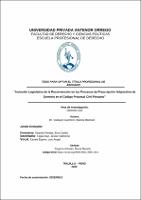Mostrar el registro sencillo del ítem
Inclusión legislativa de la reconvención en los procesos de prescripción adquisitiva de dominio en el Código Procesal Civil Peruano
| dc.contributor.advisor | Zegarra Arévalo, Ronal Manolo | |
| dc.contributor.author | Vásquez Guerrero, Bianca Marissel | |
| dc.creator | Vásquez Guerrero, Bianca Marissel | |
| dc.date.accessioned | 2022-06-16T22:07:52Z | |
| dc.date.available | 2022-06-16T22:07:52Z | |
| dc.date.issued | 2022 | |
| dc.identifier.uri | https://hdl.handle.net/20.500.12759/9080 | |
| dc.description.abstract | La presente tesis intitulada: “inclusión legislativa de la reconvención en los procesos de prescripción adquisitiva de dominio en el código procesal civil peruano”, nace de la inquietud académica que nunca debe perder de vista el estudiante de Derecho ni mucho menos el abogado; pues, es justamente esa inquietud la que muchas veces puede llevar a mejorar nuestro sistema legislativo en pro de todos los operadores y usuarios del servicio llamado justicia. El tema que a continuación presentamos busca cuestionar algo que nuestra práctica judicial, basada justamente en nuestro Código Procesal Civil da por sentado, y es el hecho que en los procesos de prescripción adquisitiva de dominio no admiten reconvención. En ese sentido, realizando un estudio a partir del estudio doctrinario e incluso legal de la reconvención y de la prescripción adquisitiva de dominio, reguladas en nuestro ordenamiento nacional; hemos podido encontrar los argumentos suficientes para concluir que no existe impedimento alguno para incorporar legislativamente la reconvención en un proceso de prescripción adquisitiva de dominio. Por ello es que en esta investigación nos hemos formulado la siguiente pregunta: ¿Por qué se debe regular en el Código Procesal Civil peruano la posibilidad de reconvenir en los procesos de prescripción adquisitiva de dominio?, formulándonos como hipótesis: Cuando el artículo 559 del código procesal civil prohíbe la reconvención en los procesos de prescripción adquisitiva de dominio, está contribuyendo a una situación de incertidumbre, dado que siempre va a existir la posibilidad latente que simultáneamente a este proceso existan otros más, entre las mismas partes respecto del mismo bien, pero con roles opuestos, los que, de terminar con sentencias contradictorias haría imposible su ejecución, dificultaría la correcta administración de justicia, atentando así la tutela jurisdiccional efectiva”. La misma que ha sido corroborado con las conclusiones señaladas en la parte final de nuestro trabajo y que hoy sometemos a aprobación. | es_PE |
| dc.description.abstract | This thesis entitled: ““legislative inclusion of the counterclaim in the processes of acquisitive prescription of domain in the Peruvian civil procedural code““, arises from the academic concern that the law student should never lose sight of, much less the lawyer; Well, it is precisely this concern that can often lead to improving our legislative system in favor of all operators and users of the service called justice. The issue that we present below seeks to question something that our judicial practice, based precisely on our Civil Procedure Code, takes for granted, and is the fact that in the processes of acquisitive prescription of domain they do not admit counterclaim. In this sense, carrying out a study based on the doctrinal and even legal study of the counterclaim and the acquisitive prescription of domain, regulated in our national order; We have been able to find sufficient arguments to conclude that there is no impediment whatsoever to legally incorporate the counterclaim in a process of acquisitive prescription of ownership. For this reason, in this research we have formulated the following question: Why should the Peruvian Civil Procedure Code regulate the possibility of remonstrating in the processes of acquisitive prescription of domain?, Formulating ourselves as hypotheses: When article 559 of the code Civil procedure prohibits the counterclaim in the processes of acquisitive prescription of ownership, it is contributing to a situation of uncertainty, since there will always be the latent possibility that simultaneously to this process there are others, between the same parties with respect to the same good, but with opposite roles, which, if they end up with contradictory sentences, would make their execution impossible, would hinder the correct administration of justice, thus undermining effective judicial protection ”. The same that has been corroborated with the conclusions indicated in the final part of our work and that we are submitting for approval today | en_US |
| dc.description.uri | Tesis | es_PE |
| dc.format | application/pdf | es_PE |
| dc.language.iso | spa | es_PE |
| dc.publisher | Universidad Privada Antenor Orrego | es_PE |
| dc.relation.ispartofseries | T_DERE_559 | |
| dc.rights | info:eu-repo/semantics/openAccess | es_PE |
| dc.rights.uri | https://creativecommons.org/licenses/by/4.0/ | es_PE |
| dc.source | Universidad Privada Antenor Orrego | es_PE |
| dc.source | Repositorio Institucional - UPAO | es_PE |
| dc.subject | Procesos | es_PE |
| dc.subject | Dominio | es_PE |
| dc.title | Inclusión legislativa de la reconvención en los procesos de prescripción adquisitiva de dominio en el Código Procesal Civil Peruano | es_PE |
| dc.type | info:eu-repo/semantics/bachelorThesis | es_PE |
| thesis.degree.level | Título Profesional | es_PE |
| thesis.degree.grantor | Universidad Privada Antenor Orrego. Facultad de Derecho y Ciencias Politicas | es_PE |
| thesis.degree.name | Abogado | es_PE |
| thesis.degree.discipline | Derecho | es_PE |
| dc.subject.ocde | https://purl.org/pe-repo/ocde/ford#5.05.00 | es_PE |
| renati.advisor.orcid | https://orcid.org/0000-0002-3986-1831 | es_PE |
| renati.author.dni | 72791054 | |
| renati.advisor.dni | 19098159 | |
| renati.type | https://purl.org/pe-repo/renati/type#tesis | es_PE |
| renati.level | https://purl.org/pe-repo/renati/level#tituloProfesional | es_PE |
| renati.discipline | 421016 | es_PE |
| renati.juror | Obando Peralta, Ena Cecilia | |
| renati.juror | Tapia Diaz, Jessie Catherine | |
| renati.juror | Zavala Espino, Luis Ángel. | |
| dc.publisher.country | PE | es_PE |
Ficheros en el ítem
Este ítem aparece en la(s) siguiente(s) colección(es)
-
Derecho [481]


